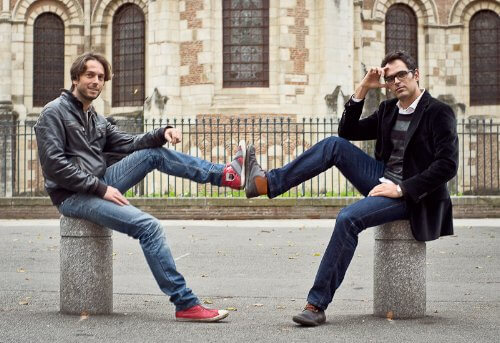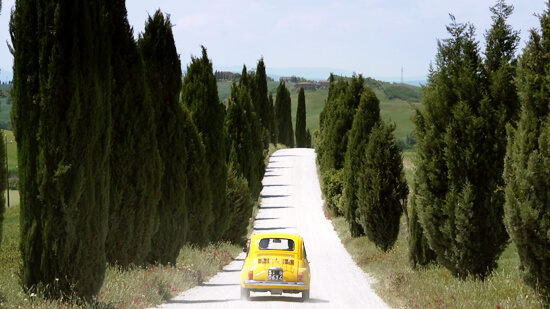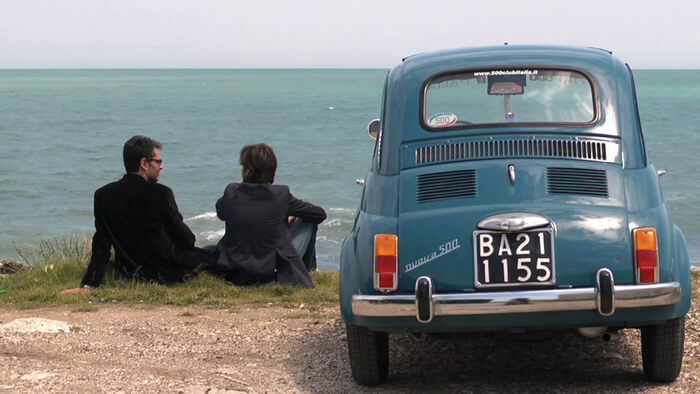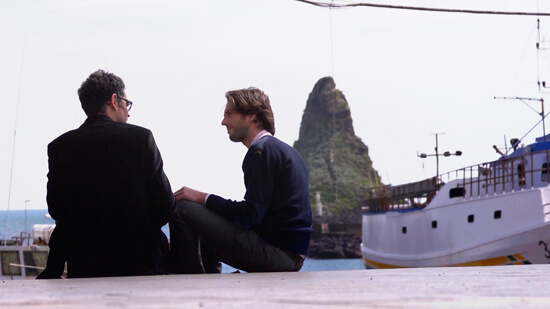What problems exist in your country? Do you feel so fed up with your home country that you consider leaving it? What elements make you stay? These are universal questions, ones that many people, including me, ask themselves. In Italy, perhaps the dichotomy between a country’s pros and cons is stronger than anywhere else. Gustav Hofer and Luca Ragazzi are a couple from Rome who are making some interesting statements about politics, gay rights, and culture in Europe and specifically Italy. I’m very excited to continue my look at Italy with this interview with documentary filmmaker Gustav Hofer.
I’m excited not just because Gustav and Luca are fabulous. It’s personal, too. After years of believing I wasn’t fulfilling my destiny to live in the place I’ve felt so drawn to for 20 years, I was invited to the Florens 2012 cultural heritage & economics conferences, and this opened my eyes. The repeated theme was the embarrassing lack of funds, innovation and preservation in modern Italy and the need for deep change. While I’d still move there in a heartbeat, Hofer and Ragazzi’s work emphasizes the disfunction that exists in Italy and contrasts with the progress in much of the rest of Europe. As a resident of California, a land of contrasts, I identified with the themes of this film “Italy: Love It or Leave It,” and I’m sure you will, too. (You can get Italy: Love it or Leave it here on Amazon
or here on Google Play).
Jenna: Tell us a bit about who you two are and about your films.
Gustav: Luca is born and bred in Rome, he comes from a family of filmmakers and Luca himself was a filmcritic for almost 20 years. I am from Northern Italy, from South Tyrol and part of the German speaking minority in Italy. I had studied in Vienna and London and I moved to Rome in 1999, where I work as journalist for a French-German TV.
We became filmmakers by accident through our first film “Suddenly Last Winter”, a documentary about the fight for Equality for gay couples in Italy. We made that documentary for our personal urge to tell what was going on but we thought it would be something we would only show to our friends. But then, the film got selected to the Berlin International film Festival in 2008 and that changed our life.
After 2 years travels with the film around the world to festivals, we were looking for a new issue for our second film. We realized that more and more friends of ours started to leave Italy and in each country we went to, we met Italians of our generation. As we only do films that matter to us personally we thought that this would be the right theme for our second doc.
Jenna: I live in a place where a “dream life” can indeed exist, but only for those who are very rich or lucky. Most people consider it a spectacular place with excellent food and wine and incredibly beautiful, diverse nature, but also deep inequality, malfunction and debt. I’m describing my home state of California. How would you describe the Italy of today?
Gustav: That’s a tough question! Since we made the film quite a few things changed. Before we had the oldest politicians in Europe, now we have the youngest parliament and the youngest prime minister of Europe. Finally the generational Passover has taken place. But nevertheless Italy is still a quite conservative country which is afraid of any change. The society is still chauvinist, closed. It’s a country that today has to decide which way to go and it has to prove if it is ready to go towards a new direction.
Jenna: You’ve said that you often don’t relate to your own country. I feel the same way when I see certain lifestyles and ways of thinking in the U.S. In what specific ways do you feel disconnected from your country?
I think that it is quite normal. We all try to surround ourselves with people who we share similar views and ideas. That makes us think, that probably most of the people think in the same way. When we discover that we were living in a kind of bubble, it can be disorienting. I feel disconnected when I hear people talking against minorities or when we see how people lack of respect for Italy’s beauty, how people continue to destroy our environment and how many Italians still today have not understood that if foreigners love our country it’s for its beauty. But if we don’t start to protect that beauty, we are going to lose it.
Jenna: A lot has been made lately of the high unemployment in Italy, especially among young men, and the number of highly educated people leaving Italy. How do you think this situation affects Italy and the confidence of its people?
Gustav: The numbers of young unemployed people has reached 40% and those who lost hope of finding a job is even higher. Highly educated people are still emigrating and that’s a loss for our society – culturally but also economically. Our State has invested through our still good (and free) educational system to create this well educated people. But when they finish their university the chances to find a job or keep on their research in Italy are very low –or at least– the chance that they get reasonably paid for their capability is very low.
So we export well educated people all over the world losing their intellectual capacity in Italy. Their ideas often create jobs abroad while in Italy we would need these kind of jobs. So there is a feeling of frustration that if you stay in Italy it will be hard and almost impossible to make your dream come true. Hopefully this is going to change.
Jenna: I teach English to immigrants in California, so the part of your film about immigration especially caught my attention. What kind of changes should be made to improve the lives of immigrants and their assimilation into Italian society?
Gustav: What they need is an open path to citizenship in order to free them from the risk of becoming slaves. Being without documents puts them in a difficult situation and it makes it easy to exploit them. Often their children are born in Italy and went to Italian schools but nevertheless they are not Italian citizens. Inclusion instead of exclusion is what we need.
Jenna: What positive aspects of Italy make you love your country? How did those come through in your interviews with people in the film?
Gustav: It’s the humanity of the interpersonal relationships that make the difference. Our society is still much more about that than about your job and about the economical success. We still know how to enjoy life. And then there is the food, the weather, the sceneries, the arts, the culture, the men and women,…. 😉
Jenna: For an American public, what is the value of this film?
Gustav: We are glad that we discovered that people all over the world can identify with the film. The question what makes us love our country or what makes it difficult to identify with it is universal.
American audiences for us – when we screened the film at Festivals in the U.S. – are our favorites, because they just loved to go with us on this emotional trip – laughing and crying at the right moments.
Jenna: One of the things that struck me in the film is the contrast between you and your partner. It reminded me of the differences between me and my husband, who is Brazilian. You seem to be the more cautious one, exemplified in your careful driving and his scolding you for actually stopping at a red light! Do these differences reflect the regions of Italy that you come from?
Gustav: In the film we play with the clichés – but in reality – Luca is much more correct and precise than I am – even though – as a Northerner – I am supposed to be the straight one and Luca, the real Roman – should be the “head in the sky” guy….but things are not always as they appear.
Jenna: Your first film, “Suddenly, Last Winter,” is about gay rights in Europe. What good news is coming out of Italy and Europe regarding gay rights and the freedom to marry?
Gustav: There are big differences within Europe. Many countries have gay marriage now (France, Spain, Portugal, UK, Denmark, etc.), others have civil partnerships or similar solutions. Only Greece and Italy have absolutely no recognition for same-sex couples. We are from a legal point of view still in the dark ages in Italy when its coming to lgbt-rights.
Jenna: What’s next for Gustav and Luca?
Gustav: We have released our new film “What is Left?” in December in Italy. It’s again about our country, a trip into the fool and strange politics of our country. We are very excited that the film will have the US-Premier at the Minneapolis International Film Festival. In April we’ll be back in the U.S. – we love it!
For more about Gustav and Luca’s work:
the trailer for their latest movie










I may have to see this film again because I am starting to feel like it’s time to leave. I am not sure that interpersonal relationships is enough to keep one in a country – actually I have very few. Like the qualities of a person you love, if you make a list it doesn’t add up, but there’s something about the whole that you just cannot help but love.
I am interested to see what the american public feels watching the movie, other than sadness. It was and still is a highly relevant film here, very much “too true”, and it’s interesting that you managed to find so many parallels to your own experience and life in california. I thought it would seem less relevant to you.
I have more to say in response to your comment than I can easily put down here. First, I am sorry to hear you say that it may be time to leave, but you have been there a long time, and I know living/working in Italy is not always easy. The film was also relevant to me for a few reasons, first because I love Italy and am intrigued by anything that shows me more of the “real” Italy; second, because it appeals to me because I’m inquisitive and enjoy knowing what’s going on; and finally, because California is a land of contrasts like Italy is. Plus, most people have a fascination at least on some level with Italy (or at least they can recognize the country’s incredible historical and cultural importance), so this film should be relevant to the general public. This is Italy we’re talking about! Not a town in Iowa! 🙂
Jenna, grazie for introducing us to Luca, Gustav and their documentary. As Italy is a place that Shawn and I have also contemplated trying to live in someday – does that include most of us? 🙂 I enjoyed the interview. And, you convinced us to rent Love it or Leave it. Having just gotten back from Emilia-Romagna and Veneto, where we had similar discussions with the locals a few weeks ago, I’m eager to watch it.
I would love to hear your thoughts after watching and to know how the locals’ thoughts in the Emilia-Romagna region align with the filmmakers’ concerns.
Jenna, I’m finally swinging by after having watched the documentary a few weeks ago, which we really enjoyed because of its real, and not just storybook-portrayal of the country. Earlier, you expressed curiosity about the thoughts of the locals that we met during our recent travels in Northern Italy. Some mentioned that the quality of life has changed, and that times were tough, but really, their comments weren’t much different from what we’ve recently heard in Croatia or Greece, perhaps even in the United States.
On a side note, I saw that one of your readers was having a difficult time finding the documentary. We were in Germany when we watched it, and rented it via Google Play. Thought that might work for others too. Thanks again for putting it on our radar.
Thanks for the comment, Tricia! Interesting to hear your take on the thoughts of those you’ve met along the way. I think many countries have been experiencing similar issues, but the point of the film is partly that in Italy there exists such a contrast (between the beauty + amazing potential and the backwards thinking + inefficiency), possibly more so than anywhere else. Now I’m off to see your post about the market in Modena 🙂
Agreed, Jenna. 🙂 As we mingle more with others from around the world, it seems the ‘grass is greener’ mentality exists most everywhere. While visiting some of the Mediterranean countries that have been experiencing economic challenges, we’ve asked, “Why here? From incredible archaeological monuments and culture, to wonderful scenery and climates, there is so much going for x place.”
My husband shared this article with me recently, and it sheds even more light on Italy’s challenges: http://online.wsj.com/news/articles/SB10001424052702303987004579479973324993200
Here’s hoping things will rebound in Southern Europe. Traveling to those spots and meeting people affected by the recession certainly humanizes the stats we read about in the news.
Thanks for sharing htat article. I’m always looking for interesting bits about Italy and pin them to this board: http://www.pinterest.com/jennafrancisco/italy-news/
And you’re right about the grass is always greener perspective. I feel like everywhere is nicer than where I am…that comes partly from blogging and seeing all the beautiful and interesting places people are going 😉
Fascinating article, Jenna. Spain’s not without its problems. And, despite being geographically closer to Africa than Europe, we’re not exempt from them in Gran Canaria.
Thanks for sharing! I know very little about the problems in Spain or Gran Canaria but do realize that the problems in Italy are common across all of Southern Europe.
Great interview Jenna, and a very thought provoking subject. I think it’s important for all travellers to appreciate that their favorite destinations are more sombre and complex than the typical tourist view of the world.
Yes, Jo, the places we visit are so much more than just what tourists see. Thought provoking and important, indeed!
ooohh. I look forward to seeing the film.
What is happening in Italy, is the same in Spain. Spaniards can’t find jobs and many are being forced to emigrate. Having studied anthropology and a traveler, I always think about culture and all the impacts. What are/will be the ramifications it will have on the culture, infrastructure, families, the future generations? It’s not gonna be good. Yet as a native Californian, I also think about all that’s happening in the Bay Area and the gentrification and evictions that are happening before our eyes. In many ways, it’s similar but in a different context. What happens when some jobs are highly valued and those individuals have a significant power both direct and indirectly on the changes that are happening.
Great interview!
Very good points, Lauren! The Bay Area is definitely getting out of hand, and it makes me sad to see how people end up living so far away from their work as a result. People live in Berkeley yet work in Napa; I even have a colleague who lives in SF but works in Sacramento! The sense of place and community is greatly affected.
I have a friend who’s from Spain but lives here, and because we often say that we’d like to live there or in Portugal, he always reminds us of the problems in Spain. I hope things get better in Spain and Italy. The younger generation face tough choices, as the film clearly shows.
Great interview, thank you for sharing it. I’ve been meaning to see the movie but can’t find it anywhere.
My opinion is that there is no perfect country, we’ve heard a lot of stories from Italians who are frustrated with their government etc…But you can go to any country and hear similar rants, even Canada, here there is a lack of nurses and doctors because at one point they were all moving to the US.
Surrounding yourself with like minded, kind and supportive people makes any country more liveable.
Are you in Canada? Let me know and I’ll check into it. The movie has been released at different times in the different countries.
really good interview, im going to have to watch this video
What a great look at what life is really like living in Italy – truly an eye-opener for sure! But you know, there are great differences in societies no matter where you live…east, west…north and south…there will always be the pros and cons and that’s just life. I am sorry for Italy’s high unemployment…wow! 40% is staggering!! But I do love Luca’s and Gustav’s perspective .. “We still know how to enjoy life. And then there is the food, the weather, the sceneries, the arts, the culture, the men and women,…” Despite all the adversity they face, they still have their priorities straight. It’s time for me to see their film!!
I really have to go and see this movie now…
Italy’s just never making it easy to anyone, it likes keeping things a bit complicated. Now it’s exactly 20 years ago I went there to study, and right then I was sooo determined to start a life there and never leave… Then after spending off and on a longer time there, just a few years later, I got instead sooo determined never to live there again… :-). Now it’s way more balanced, I like it – and sometimes criticise it – from a safe distance. But still think it’s a beautiful place, with that added element of complication, just to make it a bit more challenging I guess… But it would be nice if a more sane balance would take place soon, although it almost feels like the world is adapting to Italy sometimes, getting more difficult in other places too, and not the other way around…
Great interview, I really enjoyed reading it.
I was there as a student in Jan. 1995, so we were there at practically the same time. Interesting how it attracts young students and, at least in our cases, leads to a deeper interest in art and culture.
So glad you enjoyed the interview! I’m sure you will enjoy the film, too!
Funny, I was there the first half of ’94 and then every summer between ’95-’97. I’m also sure that without my Florence stays the interest for the arts likely wouldn’t have happened.
Sounds a bit like me. I was there for a month in 1995, went back the following year for a month, then the summer of 1997 just for a quick stop. 🙂
I haven’t seen the film but I wonder if they address some of the other economic issues that are a side effect of the culture such as mammoni. I lived in Italy for five years. I’m now in the US for a short time before returning. My husband is Italian and I guess so is my poodle. It’s a beautiful country, there’s no denying it, but living there for longer than one year can certainly blur the beauty. I’m glad that people are getting it out into the world, hopefully it will inspire a cultural shift before the country falls into (further) ruin. At this moment, half of my husband’s childhood friends are working abroad. The last time we were in his hometown it seemed like every person we stopped to talk with was moving out of Italy. All of these people were highly educated architects, engineers, chemists, Italy is losing it’s entire population of educated people because the wages are so low. How low? My husband has a MS in Engineering and was making about the same that most baristas make in the US. Something’s got to change at a cultural level.
As far as I remember, they don’t address mammoni in any depth, but there are some references to them. But I might be thinking of interviews I saw instead of the actual film…I’d have to watch again to know for sure.
I hear similar complaints about wages and educated people leaving in Brazil, but the problem in Italy seems to be out of control. I have been surprised to hear about how people don’t get paid on time and self-employed people can’t rely on payment from clients. Some of those basic things have got to change for people to have confidence in their culture and future.
Very interesting, Jenna! Thanks for featuring these guys and their perspective. So many places are romanticized by foreigners (especially Italy!) it’s good to be reminded that they can be really challenging places to live with serious economic and social justice issues of their own. I need to check out this film.